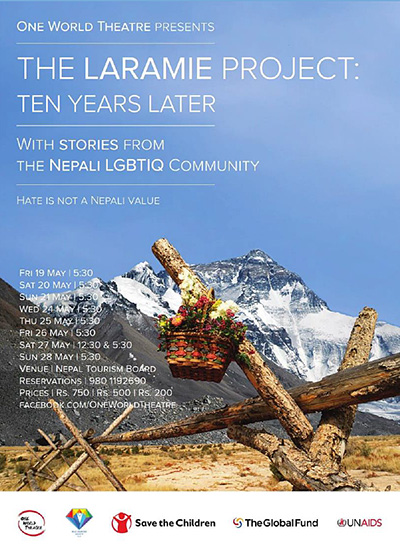The United Nations and the Blue Diamond Society in Nepal, jointly celebrate the International Day Against Homophobia, Transphobia and Biphobia and the International Family Equality Day
Date:
[The United Nations in Nepal | Press Release]
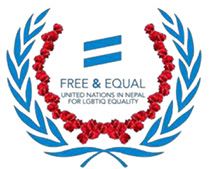
Kathmandu, Nepal — Focusing on the role of families for the well-being of Lesbian, Gay, Bisexual, Transgender, Intersex and Queer (LGBTIQ) people, and countering the reclaiming of 'family values' by conservatives, the United Nations in Nepal, in collaboration with the Blue Diamond Society, observed the International Day Against Homophobia, Transphobia and Biphobia, and the International Family Equality Day, by raising the Rainbow Flag in the UN House, for the first time in Nepal.
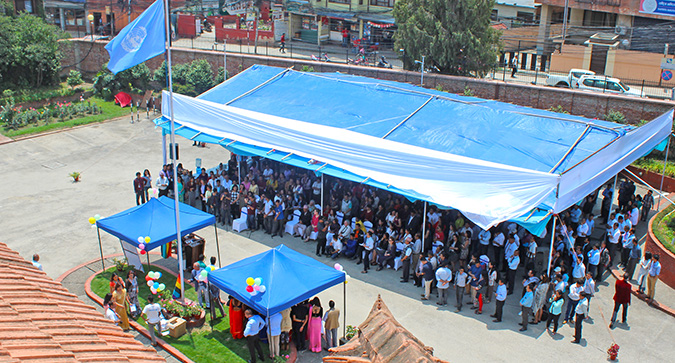
UN Resident Coordinator, Valerie Julliand in her welcome address underlined the significance of the event by reiterating that “the Universal Declaration of Human Rights, on which the United Nations is founded, states that "ALL human beings are born free and equal in dignity and rights". She went on to say that “the Declaration does not say "Some" – it says “All” – there is no exception.”
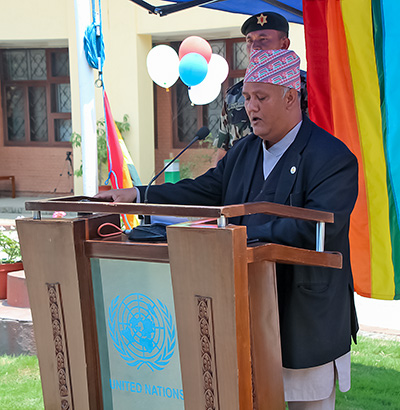
Recognizing the symbolic act of raising the Rainbow flag in the UN House, the Resident Coordinator said, “The raising of the Rainbow flag, alongside the UN flag, is a symbol of our commitment and our determination to defend and uphold the rights of all families; all the rainbow families. The red in the flag symbolizes: life; orange symbolizes healing; yellow represents sunlight; the green is for nature; blue, symbolizes harmony and peace, and purple and violet symbolizing: spirit. These symbols remind us that Love makes a Family, and we are very proud to have the Rainbow Flag flying high in our UN House, together with the flag of the United Nations.” She concluded her remarks by reminding the audience that standing together here today “Free and Equal,” is to ensure that no one is left behind.
Participating in the event, Nepal’s Minister of the Ministry of Women Children and Social Welfare, Kumar Khadka, said, “Our Constitution prohibits discrimination against sexual minorities, and it guarantees special provisions by law for their protection, empowerment and advancement. Under the right to social justice, the constitution guarantees the participation of sexual and gender minorities in state structures on the basis of the principle of inclusion. It also uses gender neutral language with regard to citizenship identities, and protects gender and sexual minorities and people with HIV from discrimination on the basis of their health status.”
He went on to add that Nepal’s recognition of third gender category in citizenship card and passport, which came into effect in 2013, is a historic and progressive move to prove that Nepal is an open and inclusive society. The minister on behalf of the Government of Nepal, made a commitment to advance normative frameworks “to recognize, include and protect our lesbian, gay, bisexual, transgender, intersex and queer citizens.” Expressing his appreciation to the UN and its partners, he hopes that “this practice will continue in the future.”
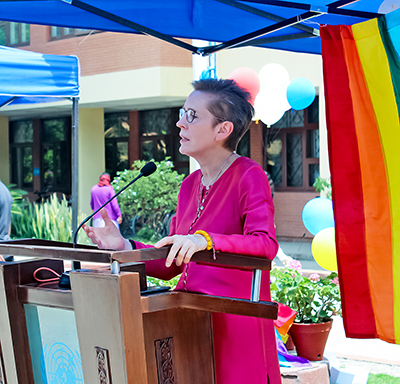
The National Human Rights Commission, represented by one of its leading commissioners in supporting the LGBTIQ rights and issues, Mohna Ansari said that: “if you have rights, you have responsibilities, and our responsibility today, and every day, is to educate those who don’t know; - educate those who are ignorant and mis-informed, and give proof to those who are prejudiced, that all people, regardless of religion, cast, gender or sexual orientation, once respected and valued, can and will accomplish their full potential.” She highlighted the importance of seeking legal protection when discriminated against on the basis of gender, sexual orientation or identity, as these unacceptable acts of discrimination are still happen in Nepal, despite constitutional protection. She further reminded that the National Human Rights Commission stands fully committed to support and protect the rights of the LGBTIQ communities.
Speaking on behalf of all LGBTIQ people, Pinky Gurung, President of the Blue Diamond Society emphasized the importance of ‘Families’ and their role in celebrating “diverse sexual orientation and gender identities.” “Today is about families and we are celebrating,” she said.
She went on to add that “the struggle of sexual and gender minorities first starts within us and our families. Because for many of us support from our family, in terms of emotional, economical and physical help, the life of us, sexual and gender minorities, is often hard and difficult. There have been many instances where people from this community have even taken the extreme decision of committing suicide, due to the lack of education, health and employment opportunities. These are not just imaginary examples; this is our harsh reality.”
Expressing gratitude and respect to families she said “We get motivated and feel confident to fight against social prejudice and exclusion only when our family helps us, supports us and accepts us.”
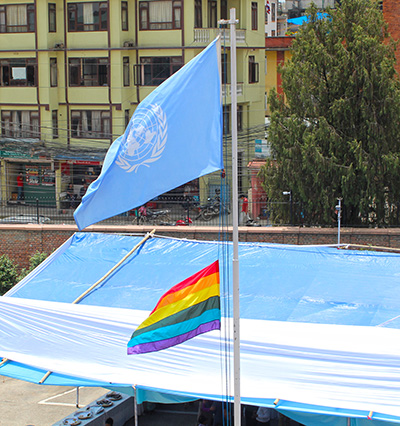
Concluding her powerful remarks, she added, “Your presence here today to celebrate this day is an example that we are not alone in our continuous struggle. We feel very lucky that experts, dignitaries and renowned people are here with us, people of diverse sexual orientation and gender identities, and I would like to thank you all for being with us and standing for equality. We feel pride that with the support from you all Nepal is becoming one of the most LGBTIQ-friendlynations in this entire world. And I truly believe that Nepal would be an LBGTIQ paradise for everyone, soon.”
The event included celebrating Nepali Rainbow Families, when family members of LGBTIQ people stood hand in hand to express solidarity, and promote acceptance and tolerance. Four members representing the families spoke of their pride to see the breakdown of fear and shame, and the importance of open acceptance and support for their LGBTIQ children or brothers or sisters or parents.
The programme ended with a joyful raising of the Rainbow Flag by the UN resident Coordinator and members of the LGBTIQ communities.
This celebration was attended by UN dignitaries, government officials, diplomats, and members of civil society and the media. UN Cares, UNAIDS and The Blue Diamond Society were the main organisers of the event.
MEDIA CONTACTS
[ Click to reveal ] and
[ Click to reveal ]
To celebrate the International Day Against Homophobia, Transphobia and Bi-phobia, and to underscore that “hate is not a Nepali value,” The Blue Diamond Society and One World Theatre, in collaboration with Save the Children, The Global Fund and UNAIDS, will be staging the docudrama “The Laramie Project: Ten Years Later, with stories from the Nepali LGBTIQ Community, from 19 to 28 May to 2017 at the Nepal Tourism Board Auditorium.
